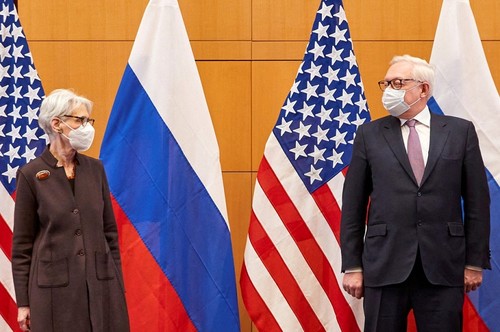 US Deputy Secretary of State Wendy Sherman and Russian Deputy Foreign Minister Sergei Ryabkov (photo: Denis Balibouse/AP) US Deputy Secretary of State Wendy Sherman and Russian Deputy Foreign Minister Sergei Ryabkov (photo: Denis Balibouse/AP) |
The dialogue took place with US-Russia relations at their worst since the Cold War. It focused on Russia's proposed security guarantees and the most thorny security issues in the two countries’ relationship for many years – concern about one another’s military activities, and the Ukraine crisis. It was the first of three meetings this week relating to Ukraine. There will be a meeting of NATO and Russia on Wednesday in Brussels, and a meeting of Russia and the Organization for Security and Cooperation in Europe in Vienna.
No breakthrough
The meeting, attended by Russian Deputy Foreign Minister Sergei Ryabkov and US Deputy Secretary of State Wendy Sherman, took place in a frank and forthright atmosphere, both sides said. It was an opportunity to better understand each other’s priorities, but no specific time frame was set for any issue. The US Deputy Secretary of State said she still does not know whether Russia is prepared to de-escalate the situation with Ukraine. The US wants Russia to withdraw thousands of troops from the Ukraine border or clarify its military activities there.
The Russian Deputy Foreign Minister told reporters following the meeting that despite American concerns about the Russian troop buildup along the Ukrainian border, Moscow has no intention of launching military action. He said all troop combat trainings is being carried out within Russian territory, and there is no reason to fear any escalation.
Prior to the dialogue, both sides sent mixed signals.
Ryabkov said Russia would not make any concessions under pressure from the West and talks could end after Monday’s meeting, the first of three scheduled for this week. NATO talks with Russia are staled for Wednesday in Brussels, followed by talks between Russia and the Organization for Security and Cooperation in Europe Thursday in Vienna.
Before the meeting Ms. Sherman said the United States is committed to the international principles of sovereignty, and territorial integrity, and the freedom of sovereign nations to choose their own alliances. US Secretary of State Antony Blinken said on CNN that there was no breakthrough at the dialogue.
Long confrontation between Russia and the US-led West
Russia-US relations have been tense for years. During the Trump administration, US policy towards Russia was unclear. But the Biden administration has taken a tougher approach in its relations with Russia – more confrontation than cooperation.
Analysts say that the Russia-West confrontation stems from geo-political competition for influence and position as well as conflict of core interests. The eastward expansion of NATO by granting membership to Russia’s neighbors and deploying weapons and troops near the Russian border are perceived as existential threats by Russia. Russia has always reciprocated Western provocations and sanctions.
In past years Russia and the US have repeatedly spoken of resetting bilateral relations, which suggests they recognize the importance of a stable relationship. But a thawing of relations will be hard to achieve.